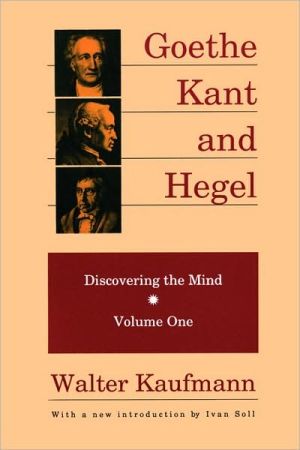

 |

|

The average rating for Goethe, Kant& Hegel, Vol. 1 based on 2 reviews is 3 stars.
Review # 1 was written on 2016-06-25 00:00:00 Pelayo Marinas Pelayo MarinasKaufmann's Goethe and Kant are crude monochromatic mischaracterizations, and although this makes for fun reading, it isn't historically accurate and involves a lot of cherry-picked textual and biographical examples. Goethe is presented as a playful, socially outgoing conversationalist, and Kant as an overly provincial, unread tyrant of letters. Of course Goethe could be playful and social, but he was equally known from diary and memoir anecdotes for his ridiculous humorlessness, for monopolizing social attention at parties, and for bossing around guests at soirees. As for him being some kind of cosmopolitan figure because he traveled to Italy, oh good God. For most of his life he was stuck in provincial Weimar, with only a small (though highly distinguished) local following, and with the entire local aristocracy hating him and the local press ridiculing him on a regular basis. As for him being some prolific civil servant, Goethe was Director of Highway Construction and Court Councillor for Urban Pavement Construction. His greatest accomplishment was getting Weimar to repave their roads and ban spitting tobacco in public; not exactly on par with Haussmann rebuilding Paris! Regarding Kant, Kaufmann makes a big fuss that he never read Rousseau. Kant refers to Rousseau explicitly in his anthropological writings, and Kant's concept of "productive imagination" comes directly from his reading of Rousseau's criticisms of Locke in Emile. It wasn't just an accident that the only portrait in Kant's house was of Rousseau, though this is actually how Kaufmann presents it. Kaufmann also takes a short passage from Kant's anthropological lectures, on the conventions of dinner table talk, and blows it out of proportion as if it were Kant's attempt at an authoritarian law on how to talk at dinner parties (this is really the most ridiculous point in the whole book). Kant says discussion typically begins with storytelling ("You'll never believe what happened to me today..."), progresses to more serious subjects and argumentation, then ends with jokes. To my mind that's pretty accurate. Lastly, it's entirely characteristic of Kaufmann that Kant is ridiculed as a philistine for not being more familiar with Goethe, while Goethe is given a pass for only reading a few sections of the Critiques and The Metaphysics of Morals. I suppose we're supposed to see this as an example of Goethe's discerning philosophical taste, given he typically ignored his contemporaries. The book also includes shorter sections on Kierkegaard and Schopenhauer that are similarly bonkers. Kaufmann claims Schopenhauer's philosophy came from reading only Plato, Kant, and the Upanishads, and dismisses his philosophy as the work of a poorly read scholar. This is easy to refute since (at least in his essays) Schopenhauer either refers to or explicitly quotes from figures as various as Seneca, Cato, Augustine, Locke, Hutcheson, Hume, Rousseau, Goethe, Spinoza, Pierre Bayle, Jakob Bohme, Condillac, Schiller, Christian Wolff, Johann Meister, and Voltaire (one of Schopenhauer's favorite writers). By any standard he was a voracious reader, which is why it's all the more puzzling Kaufmann makes such a big deal of saying the otherwise. So this is a fun, well written, and rather bitchy book, but good God don't mistake Kaufmann's authoritative tone for anything other than his own grandiloquent opinions. |
Review # 2 was written on 2016-03-17 00:00:00 Raeven Harris Raeven HarrisThis is essential reading for any student of philosophy or psychology. I have recently read Kant's Critique of Pure Reason and On History and I am currently in the process of reading through the entirety of Hegel's Phenomenology. What Kaufman does here is illustrate Goethe as the starting point for the discovery of mind. Kaufman also points out many of the ambivalences, contradictory statements, and excesses in Kant's Critique. It was Kant's influence on Hegel that seems to have diverted Hegel's efforts from the fulfillment Goethe's ideals of autonomy, towards an attempt at a Kantian completeness and rigorousness. Kaufman closes by outlining the things that can be taken away from Hegel's work as commonalities with Goethe. Kaufman was of the opinion that Kant was a figure whom the scholars of his day could spend arguing about. It is interesting to me that Zizek has revisited Kant in his work (Kant and Sade: the Ideal Couple). I've got a lot of reading to do. A lot of reading. |
CAN'T FIND WHAT YOU'RE LOOKING FOR? CLICK HERE!!!